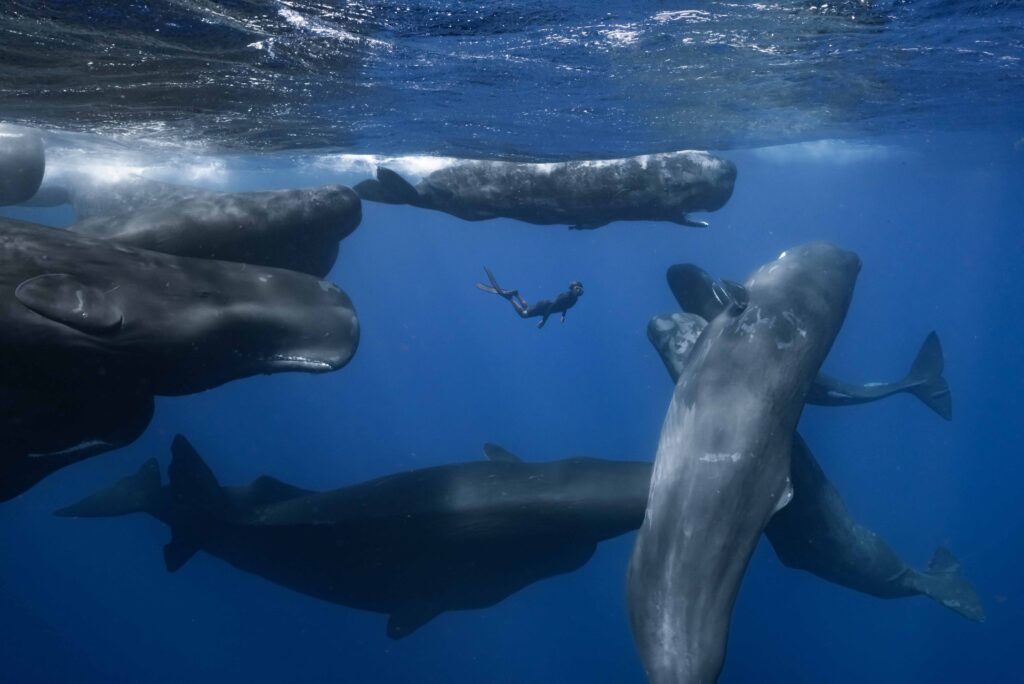Deep in the underwater world of sperm whales, Patrick Dykstra is having the time of his life as he swims around and communicates with the giants of the earth. He hopes that after seeing his award-winning documentary, people will Patrick and the Whale start caring more about sperm whales, whales and the ocean as a whole. GW spoke to the wildlife photographer and cameraman who never planned to make a film
Text: Annika Hoogeveen
"The idea came from filmmaker and friend James Reed. He was with me in Dominica when sperm whale Dolores was very curious during our reunion and lifted me out of the water. James loved it and suggested making a film about it. Much of the footage was shot with my own camera. Swimming around and filming whales, which I do a few weeks a year. But James suggested sending a film crew along to track Dolores and film her behaviour. (smiles) It didn't turn out to be the film we had in mind, but that's how it is in nature: you can't direct animals. That was also the biggest challenge."
The purpose of the documentary?
"A positive impact film. Not a documentary where hunters -like the Japanese in Antarctica- pierce whales with harpoons. Hopefully Patrick and the Whale sperm whales a more human element. That they are gentle and kind. Like us, they are individuals with different feelings and behaviours."
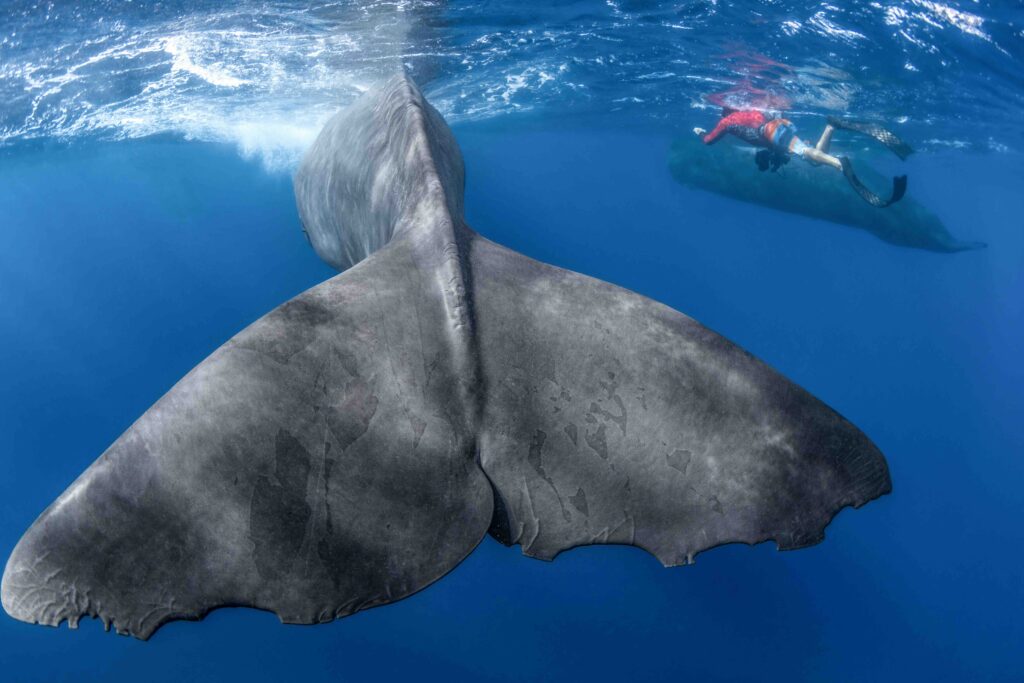 Why do you want to study the way sperm whales communicate?
Why do you want to study the way sperm whales communicate?
"Sperm whales have the largest brain of any animal on earth, they are extremely intelligent. In addition, brain complexity is also important. Sperm whales, like humans, have spindle cells and cerebral cortex. These are the parts we think make for higher functioning. There is little knowledge about what goes on in their brains. It is exciting to try to understand -knowing how intelligent and emotionally developed they are- about their social structure and the sounds they make. Interesting and complex aspects like group communication or passing on knowledge to younger generations."
Finding a blue whale was your original goal. Was it a stroke of luck that the search took longer than planned?
"My life would have been very different if I had found a blue whale on the very first day of my expedition. Tick box and move on. It was a difficult and challenging, but ultimately very rewarding quest. The lack of knowledge, about whales and the ocean, still fascinates me. We know that the sperm whale spends 40 minutes deep underwater, then comes to the surface for 10 minutes and then goes hunting again for 40 minutes. But the oceans are little studied.
It amazes me that a normal guy like me -a retired lawyer who travels the world for fun- can learn things about these animals that people did not already know, had seen or filmed. I was the first to film how a blue whale feeds her young. That attracts me immensely. It's very tempting to think that I can change the world just by being myself and not a lifelong marine biologist."
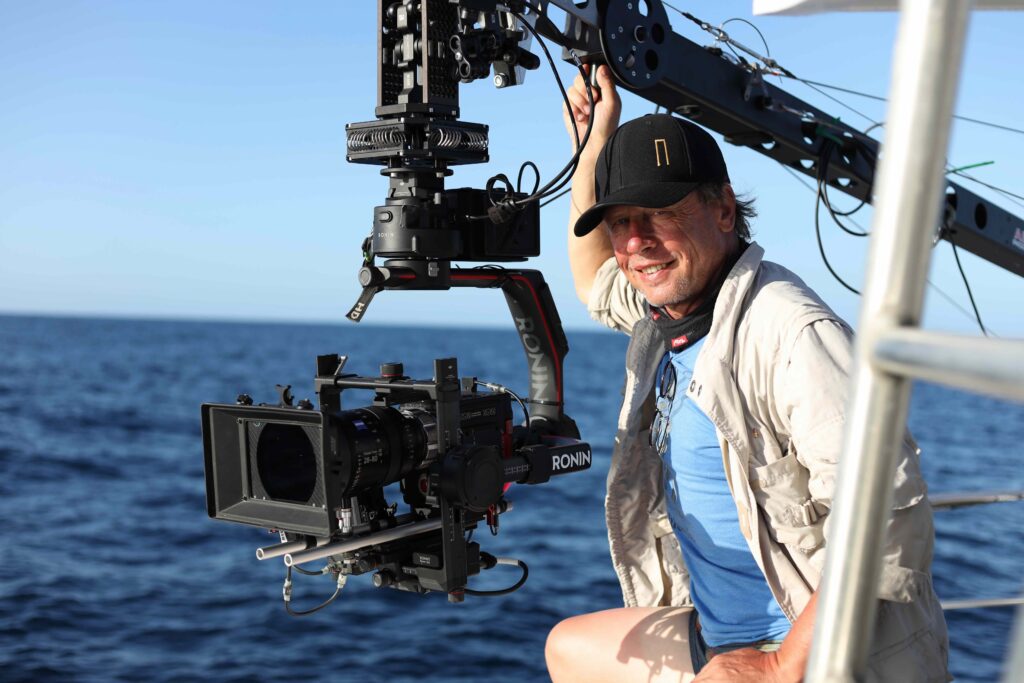 Changing the world?
Changing the world?
"Because people do not encounter whales in everyday life, they know little about them. So every year I take children from the island of Dominica to see sperm whales. Living on a small island, most of them have never seen such an animal. They don't understand that when you throw a candy wrapper on the street, after one of the many rainstorms it ends up directly in the ocean and thus in the sperm whale's habitat. It is important to help people understand who sperm whales are, what they need and what we are doing to them.
I see my role as their ambassador, by making these films and taking individuals to see them. The sperm whale population in the eastern Caribbean continues to shrink due to various factors that have one commonality: us. Entangled in fishing nets, ship traffic, eating plastic. Man is doing it to them."
Aren't you afraid of whale watching because of too much attention?
"Obviously. Fortunately, Dominica has a fairly strict and well-regulated licensing system. Not just anyone can take a boat out into the ocean and jump into the water with the whales. If the documentary were made in a location where this was allowed, I don't know if I would have participated. In this film, I tried to bring the whales so close that people no longer feel the urge to go there themselves."
Do you think sperm whales communicate with each other about you?
"That's a big risk for me. (smiles) With Project CETI, we are trying to decipher the sperm whale language and there is hope that huge progress will be made in the next five years. Perhaps I don't want that, because what if we discover that Can Opener (a female sperm whale) thinks I'm a huge asshole and she tells her friends that I'm a lousy swimmer, don't smell good and she doesn't like me at all. That I think she is my friend, but in reality she thinks I am worthless. (laughing) I am convinced they are talking about us."
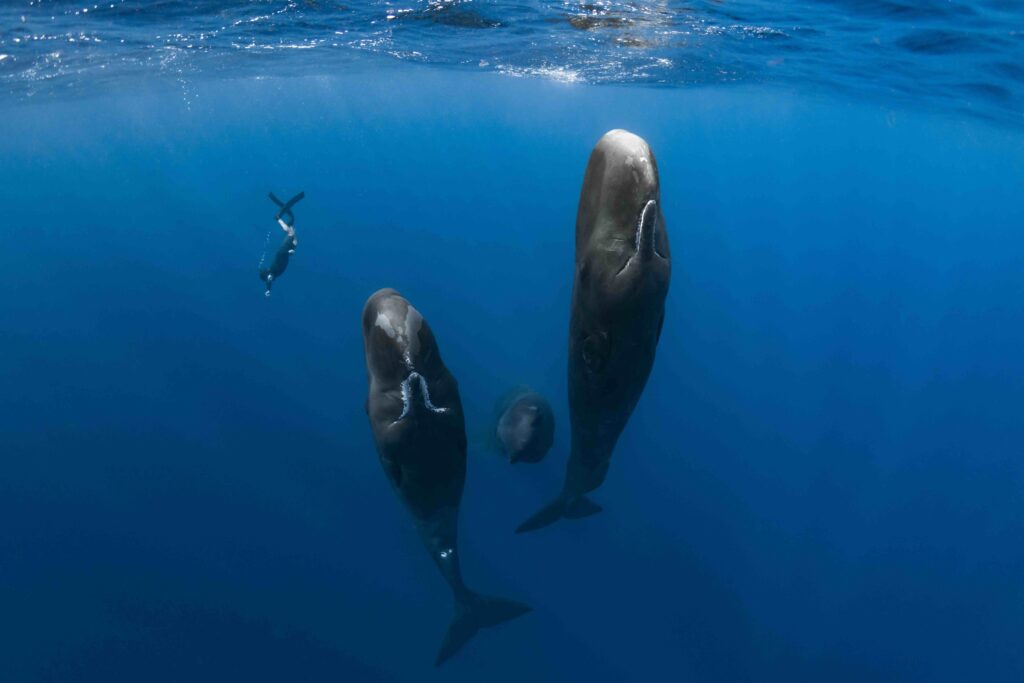 Do you think about ethics when swimming among whales?
Do you think about ethics when swimming among whales?
"Always! Every time I swim with whales or marine animals, a cost-benefit analysis goes through my head. What am I doing? When a whale turns around and decides to spend time with me, she misses out on a feeding dive by playing with me. That is one of the reasons why I started carrying a camera. My thought was to capture unique moments, make films of them and show this on television or the internet so that people receive more information and learn about these animals. Always I think about the impact I have. What is the benefit to the whale and does this outweigh the impact?"
A thrilling moment with a sperm whale takes place in this film. And a few years back, you were almost swallowed by a humpback whale. Doesn't this scare you?
"No, I think it would make a great obituary (smiles). It reads better than a heart attack or car accident. It's definitely scary, but you only have one life and while I don't take unnecessary risks, I do take them. It's worth it to me. The most dangerous situations happen because of the environment and not because of whales. When you are on a small boat at sea without a spare engine and something goes wrong or you suddenly find yourself in a storm... I love my life and don't want it to end prematurely, but you can't sit at home all day watching television either."
Has studying nature changed your attitude towards people.
"Of course. You are comparing humans to some of these animals. No animal is responsible for the mass extinction of other species. Humans are liable for that on a daily basis. We are incredibly destructive. Things we never get back. A few thousand leopards, maybe three hundred thousand sperm whales, but eight billion humans. The balance is way off. People are not good at sharing land and resources.
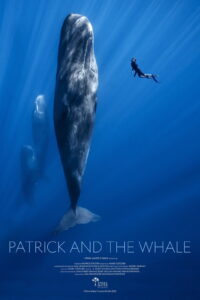 We come and take all we can take; we kill the animals. It is in human nature; I am just as guilty of it. A spider you kill and the snake in your house you throw out. Those animals lived there for millions of years until you decided to build your house there."
We come and take all we can take; we kill the animals. It is in human nature; I am just as guilty of it. A spider you kill and the snake in your house you throw out. Those animals lived there for millions of years until you decided to build your house there."
The state of nature, oceans and seas is not good. Think offshore wind farms, deep-sea mining...
"Deep-sea mining poses a big problem. Setting off explosives to create sonar from submarine beds damages everything in the vicinity. The eardrums and lungs of nearby animals-such as seals, sea lions and whales-are blown up. Plastic pollution is also terrible. A lot comes down to making the right choices. The big problem, of course, is overpopulation. Billions of people.
What can you do about it? You can't commit genocide. If you look at scientific research, women's education in developing countries is an important factor. Where women and men have equal rights -education and labour market participation- you don't find families with 13 children. So this is an important way to reduce the global population. Combine this with the wise choices about deep-sea mining, plastic use and recycling."
Captain Ahab vowed not to rest until he found his white whale. Do you have a Moby Dick of your own?
"Certainly I still have some sacred grals. I have never seen a narwhal -whale that looks like a unicorn- and would only love to witness a feeding narwhal. Besides, technology has not yet advanced enough to film a sperm whale hunting a squid in deep water. But gladly I would be the first to pull this off!"
Patrick and the Whale can be seen via Pathé Home.



